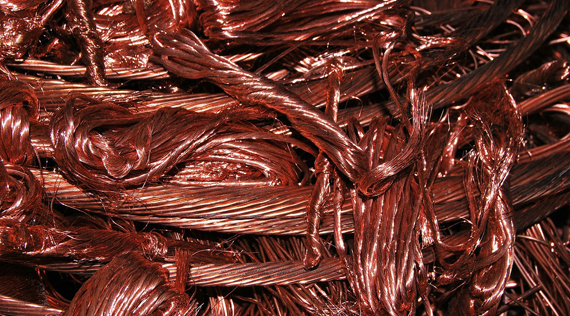
Shanghai is launching a challenge to London’s dominance in metals trading by issuing a new futures contract for copper that analysts say has the potential to become a global benchmark.
The Shanghai International Energy Exchange (INE) will start trading monthly copper futures denominated in renminbi on Thursday, in contracts based on the metal to be delivered into warehouses in China.
The launch provides the country’s first copper-linked product available directly to overseas investors — following similar initiatives in recent years for crude, iron ore and other commodities.
Analysts said the new copper contract would help Beijing increase its influence on pricing in a market that is critically important to its economy, and also assist efforts to expand the use of its currency in the global financial system.
“China does not want its economy or markets to be shaken by international markets,” said June Zuo, president at Huatai Financial in the US, which is part of the Chinese securities group.
China’s dominant status as a buyer of the industrial metal, used in everything from household wiring to wind turbines, has been the crucial driver of the market’s rebound from the coronavirus sell-off. Copper hit a two-year high of $7,179 a tonne on Monday on the back of strong demand, reflecting the recovery of the world’s second-largest economy from the pandemic.
Chinese policymakers are increasingly keen to reduce the negative impact of downturns elsewhere, market participants say. The experience of crude futures has given them “the imperative to list the new copper products”, said Ms Zuo, a former employee of the INE.
Shanghai launched its international crude oil contract two years ago, fulfilling a long-held ambition of regulators to “gradually strengthen China’s pricing power in international markets”.
The market faced a stress test in April, when coronavirus and the oil price war sent US crude prices plummeting below zero for the first time ever. China’s contract, by contrast, stayed in the region of $30 a barrel. That premium led to a flood of shipments into China, as traders took advantage of the ability to store oil through the exchange. In the space of a week, the amount of oil held in the exchange’s facilities doubled.
Some have pointed to the gap between the regional markers as signalling a decoupled market. Researchers at the Oxford Institute for Energy Studies have flagged the participation of retail investors in China driving this “anomaly”, rather than the strength of local demand for oil. But they note that the crude futures contract benefited, as capacity and liquidity were drawn to the exchange.
This helped repair the global market, said John Browning, founder of Shanghai-based brokerage Bands Financial. When ships headed to Shanghai to offload oil, he said, “commodities started to flow, and international prices started to rise”. It was a case, he added, of “theory made real”.
A copper contract could make an even bigger mark on global markets because China is the largest consumer of the industrial metal by a large margin, buying more than 50 per cent of global mined supply. Some in the industry think it could eventually challenge the London Metal Exchange’s role as the global price-setter of the metal.
While China already has a copper futures contract listed on the Shanghai Futures Exchange, foreigners need to set up a local company to use it. The INE’s copper contract will allow foreign entities direct access, and its price will not bake in value added tax, making it similar to international prices.
The metal is piled up in so-called bonded warehouses, which are outside the customs area, so free from import duties and taxes. Because the London Metal Exchange — which is owned by Hong Kong Exchanges and Clearing — has no warehouses on the mainland, the INE’s contract could provide a compelling alternative, Mr Browning said. “If it takes off, there is no reason why producers and consumers in the region could not use it as their benchmark.”
Colin Hamilton, an analyst at BMO Capital Markets, said the contract had a “high chance of being extremely successful”, given that more than 70 per cent of copper consumption takes place across Asia. China was now the “market of last resort for purchasers”, assuming they can stomach the currency risk, he added. “[We] expect this may become the international copper market benchmark over time.”
The LME said it would not comment on business conducted on other exchanges, but added that it welcomed “all initiatives that may boost trade flow and provide more arbitrage opportunities for market participants”.
The new launch forms part of a relaxation of the rules governing foreign investments into China’s domestic capital markets. This month China also loosened its qualified foreign institutional investor, or QFII, rules, to ease access to domestic futures, including for commodities.
The copper futures contract will make life easier for domestic traders to hedge international price exposure in their own currency, commodity experts say. And it should help towards Beijing’s goal to promote the use of the renminbi overseas, said Richard Fu, a metals analyst.
“It will mitigate the dollar influence in the global market,” he said. “That’s the key thing they are trying to develop — to internationalise the currency and also have more influence in the global market pricing system. China consumes almost half of the world’s commodities, so it is happening.”
Courtesy : https://www.ft.com/content/2e4c4bbe-8a74-48b8-bbf0-7635e1bec855